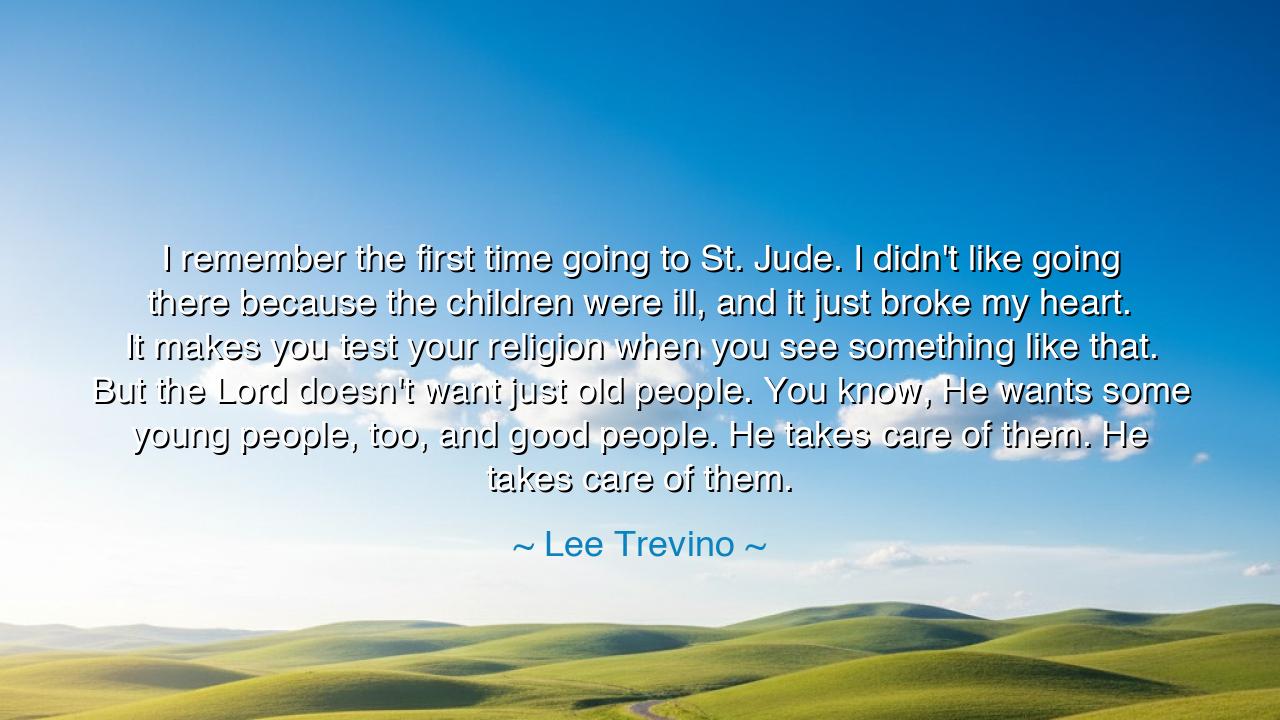
I remember the first time going to St. Jude. I didn't like going
I remember the first time going to St. Jude. I didn't like going there because the children were ill, and it just broke my heart. It makes you test your religion when you see something like that. But the Lord doesn't want just old people. You know, He wants some young people, too, and good people. He takes care of them. He takes care of them.






Lee Trevino, the great golfer with the humble heart, once spoke words heavy with sorrow and faith: “I remember the first time going to St. Jude. I didn’t like going there because the children were ill, and it just broke my heart. It makes you test your religion when you see something like that. But the Lord doesn’t want just old people. You know, He wants some young people, too, and good people. He takes care of them. He takes care of them.” In this reflection, he wrestles with one of the oldest struggles of humankind—the mystery of suffering, especially the suffering of the innocent. His voice carries the weight of heartbreak, yet also the strength of belief in a God who cares beyond what human eyes can see.
The illness of children has always been a trial of faith. To see innocence struck down feels like an injustice too cruel for words. Many through the ages have cried to heaven with the same question: “Why do the young suffer? Why are the good taken early?” Trevino admits that such sights “test your religion,” for they challenge our sense of order, justice, and mercy. Yet in his words lies a paradoxical comfort: that God’s care does not abandon those who are taken too soon, but embraces them in a realm beyond our grasp.
The ancients spoke of this mystery in their own ways. Job, in the ashes of his grief, demanded answers from God about the suffering of the innocent. The Greeks told of heroes cut down young, their brightness remembered as eternal flame. Even Christ spoke tenderly of children, saying, “Let the little ones come to me, for of such is the kingdom of heaven.” Trevino, standing in the halls of St. Jude, echoes this lineage: the pain is real, the questions pierce deeply, but faith whispers still that the young are not abandoned, but gathered, cared for, cherished beyond death.
History, too, offers examples of souls who turned the sorrow of children’s suffering into legacies of compassion. Danny Thomas, who founded St. Jude Children’s Research Hospital, did so after a prayer in his darkest days. He vowed to honor the Lord by building a place where no child would be turned away, where science and compassion would battle disease together. His vision was born out of the very same heartbreak Trevino describes—the unbearable sight of sick children. And yet, from that heartbreak came a sanctuary of hope for countless families, proof that sorrow can give birth to healing.
Trevino’s words remind us also of the mystery of death itself. We think it natural that the old should go first, yet life does not always bend to our desires. “The Lord doesn’t want just old people,” he says with reverence, acknowledging that life belongs not to us, but to God. It is a truth the ancients carried: that death is not the end, but a passage; that those taken early are not lost, but received. In this way, Trevino reframes grief into a kind of faith—that though our hearts break, God’s care is deeper than our sorrow.
The lesson is clear: suffering will test faith, but it can also deepen it. When we see sickness, when we face loss, let our response not be despair but compassion. Let us weep, yes, but let us also act. Support hospitals, comfort the grieving, bring joy to those in pain. Do not turn away from suffering because it breaks your heart—turn toward it, and let your heartbreak become the wellspring of mercy.
Practical wisdom flows from this: when confronted with the suffering of the innocent, do not hide from it, and do not allow bitterness to consume you. Instead, live in a way that brings care to others. Volunteer where you can, offer kindness to those in need, and remember that life is fragile, but love endures. Trust, as Trevino did, that God takes care of them—and let that trust inspire you to take care of the living, here and now.
So remember, O children of tomorrow: though sorrow will test you, though grief will strike you, though the sight of suffering may shake your religion, hold fast to compassion and to faith. For the measure of your life will not be in answers to mysteries too vast to solve, but in how you choose to love when confronted with pain. And know this truth: the Lord’s care is greater than death, and His love gathers every child, every soul, into an eternal embrace.






AAdministratorAdministrator
Welcome, honored guests. Please leave a comment, we will respond soon